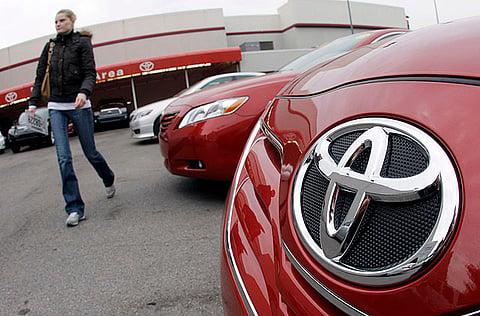Toyota profit tumbles on strong yen, but lifts full-year view
Carmaker reported a net profit of 946.1b yen in the first half of its fiscal year, down from 1.25tr yen in the same period in 2015

TOKYO: Toyota said Tuesday its April-September net profit dived 25 per cent, hit by a sharp rally in the yen and another fall in North American sales, but it upgraded its full-year outlook.
The world’s biggest automaker reported a net profit of 946.1 billion yen ($9.1 billion, Dh33.4 billion) in the first half of its fiscal year, down from 1.25 trillion yen in the same period in 2015.
Operating profit fell nearly 30 per cent to 1.11 trillion yen, while revenue was off 7.2 per cent at 13.07 trillion yen.
However the Corolla and Prius hybrid maker boosted its full-year to March net profit forecast to 1.55 trillion yen from an earlier 1.45 trillion yen estimate.
The newest figure is still way down from a record 2.31 trillion yen net profit in the most recently ended business year.
The decline in profits underscores the negative impact that a resurgent currency has had on firms doing much of their business abroad.
Japan’s exporters reaped windfall profits over the past few years as government efforts to kick-start the world’s number three economy sharply weakened the yen.
That was good for firms such as Toyota and rivals Honda and Nissan because repatriated foreign profits were worth more when the yen was weak and because it boosted their competitiveness overseas.
But the currency has rallied since the start of the year as volatile equity markets and Britain’s vote to exit the European Union boosted demand for a unit widely seen as a safe investment.
“The yen’s strength remains a major factor squeezing earnings in the Japanese auto sector,” said Shigeru Matsumura, analyst at SMBC Friend Research Centre, before the results were published.
“Japanese carmakers need to make further efforts to make their corporate structure more resistant to the yen’s appreciation,” he added.
Toyota’s vehicle sales in April-September ticked up to 5.06 million units, from 4.97 million vehicles in the same period last year, with increases in Japan, Europe and Asia.
Still, vehicle sales fell in the Middle East, Africa and the key North American market, where cheap oil has hit demand for Toyota’s fuel-efficient offerings including the Prius.
The North American sales drop was due to a “drastic shift” in demand from passenger cars to SUVs and trucks, the firm said.
Japanese automakers have benefited from healthy growth in the US where low interest rates boosted demand, although a possible rise in borrowing costs this year could erode sales.
Unsteady demand in emerging markets such as Thailand and Indonesia are also red flags, as Toyota and other major automakers wrestle with costs linked to a huge scandal at supplier Takata.
A defect in the firm’s airbags has been linked to more than a dozen deaths and scores of injuries globally, prompting the auto industry’s biggest ever safety recall to replace the problem parts and meaning huge expenses for automakers.
Automakers were also hit by temporary factory shutdowns in the south of Japan after a pair of earthquakes caused major damage and claimed dozens of lives in April, affecting production.
Stiff competition at home and abroad has pushed some Japanese automakers to eye tie-ups.
Toyota and small car maker Suzuki said last month they were holding talks about a possible partnership.
Toyota said the possible deal was prompted by the fact that it trails competitors in North America and Europe in some areas, while Suzuki is struggling to forge its own path in the fiercely competitive industry.
Nissan is buying a one-third stake in Mitsubishi Motors, forging an alliance that will challenge some of the world’s biggest auto groups.
On Monday Nissan said net profit in the April-September period fell 13.3 per cent to 282.4 billion yen, the first decline over that six-month span in four years.
Last week Honda said its net profit rose 12.1 per cent from the same period in 2015 to 351.8 billion yen, as cost cuts offset the impact of the rising yen.
Sign up for the Daily Briefing
Get the latest news and updates straight to your inbox


